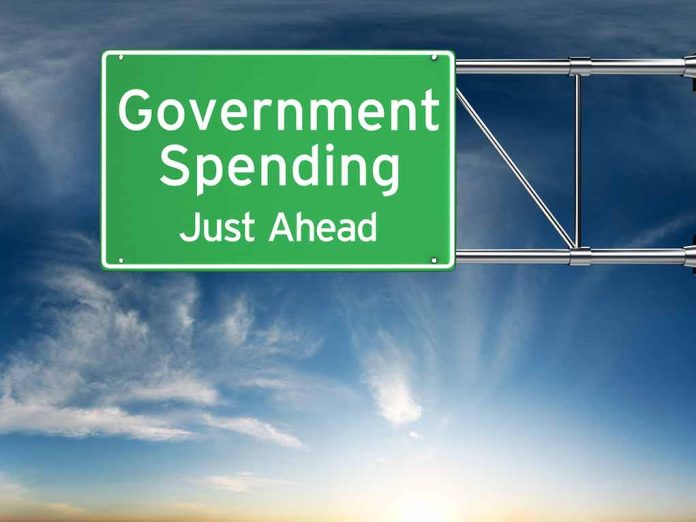
President Trump threatens to primary Republican Representatives Thomas Massie and Warren Davidson for opposing his “Big, Beautiful Bill” – a move White House Press Secretary Karoline Leavitt defends by calling them “grandstanders” who refuse to unite behind the president’s economic vision.
Key Takeaways
- President Trump is seeking to primary Republican Representatives Thomas Massie and Warren Davidson for opposing his tax and spending package, highlighting tensions within the party over fiscal responsibility.
- White House Press Secretary Karoline Leavitt criticized the representatives as “grandstanders,” emphasizing Trump’s desire for Republican unity behind his economic agenda.
- Massie and Davidson defended their opposition on principle, citing concerns about the legislation adding an estimated $3.8 trillion to the federal deficit.
- Despite White House claims that the bill “saves $1.6 trillion,” multiple independent analyses project the legislation would significantly increase the deficit by $3-5 trillion over the next decade.
- The conflict illustrates the broader tension between Trump’s leadership approach and the fiscal conservatism traditionally championed by certain Republican factions.
Trump’s Demand for Party Unity Faces Resistance
President Trump’s aggressive stance against Republican Representatives Thomas Massie and Warren Davidson signals growing friction between the White House and fiscal conservatives within the GOP. The president’s decision to target these representatives for primary challenges comes after they voted against his comprehensive tax and spending package, which forms a cornerstone of his economic agenda. This internal conflict highlights the tension between Trump’s leadership style, which prioritizes party unity, and the principle-driven approach of certain Republican lawmakers concerned about fiscal responsibility.
“I believe [Trump] does, And I don’t think he likes to see grandstanders in Congress. What’s the alternative, I would ask those members of Congress. Do they want to see a tax hike? Do they want to see our country go bankrupt? That’s the alternative of them trying to vote ‘no’ and the president believes that the Republican Party needs to be unified and the vast majority of Republicans clearly are and are listening to the president. They are trusting in President Trump as they should because there’s a reason he’s sitting in this Oval Office, it’s because he’s the unequivocal leader of the Republican Party.” said by Karoline Leavitt, White House Press Secretary
Leavitt’s characterization of the representatives as “grandstanders” reflects the administration’s frustration with what they perceive as performative opposition rather than substantive policy disagreement. The White House’s position is clear: Republicans should fall in line behind Trump’s economic vision. This approach positions dissent as disloyalty rather than legitimate policy disagreement, creating a challenging environment for conservatives who historically prioritized fiscal restraint and deficit reduction as core principles.
Representatives Defend Principled Opposition
The targeted representatives have not backed down from their positions, defending their votes as matters of principle rather than political grandstanding. Massie, known for his libertarian-leaning positions and independent voting record, described the bill as a “debt bomb ticking” that would significantly worsen the nation’s financial outlook. His colleague Davidson similarly expressed concerns about the bill’s impact on the deficit, arguing that promises of future spending cuts are insufficient when weighed against immediate fiscal impacts.
“The big beautiful bill has issues. I chose to vote against it because it’s going to blow up our debt. For voting on principle, I now have the President AND his press Secretary campaigning against me from the White House podium.” – Thomas Massie, Republican Representative
Davidson’s criticism centered on the timing and structure of the bill’s fiscal impacts. “While I love many things in the bill, promising someone else will cut spending in the future does not cut spending,” he stated, adding that “Deficits do matter and this bill grows them now.” This emphasis on immediate fiscal responsibility rather than deferred action reflects a traditional conservative approach to government spending that has often been sidelined in recent years as the party has realigned around Trump’s economic priorities.
Disputed Budget Impact Raises Questions
A key point of contention in this conflict is the actual fiscal impact of the proposed legislation. The White House, through Press Secretary Leavitt, has claimed the bill “does not add to the deficit” and would actually save $1.6 trillion. However, this assertion has been directly contradicted by multiple independent analyses that project significant deficit increases. The Committee for a Responsible Federal Budget estimates the bill would increase the deficit by $3.3 trillion over ten years, potentially reaching $5.2 trillion if temporary provisions become permanent.
“This bill does not add to the deficit. In fact, according to the Council of Economic Advisors, this bill will save $1.6 trillion. … There’s $1.6 trillion worth of savings in this bill. That’s the largest savings for any legislation that has ever passed Capitol Hill in our nation’s history.” said by Karoline Leavitt, White House Press Secretary
The Penn-Wharton Budget Model similarly projects a $3.2 trillion deficit increase, while Moody’s estimate of $4 trillion influenced its decision to lower the U.S. credit rating. Budget experts note that the White House’s $1.6 trillion savings figure only considers spending cuts, failing to account for the $3.8 trillion tax package, $144 billion for military spending, and $177 billion for other changes. This discrepancy in fiscal projections has led PolitiFact to rate Leavitt’s statement as “False,” further complicating the debate between the White House and fiscal conservatives.
“Bottom line — because that is what matters — is that simple math of all the additions and subtractions equals nearly $3 trillion in additional debt” – Steve Ellis, Budget Expert
The Future of Republican Economic Policy
The conflict between President Trump and these fiscally conservative representatives raises important questions about the future direction of Republican economic policy. The “Big, Beautiful Bill” proposes a $3.8 trillion tax cut, eliminates taxes on tips and overtime, and introduces changes to Medicaid to reduce costs. While these measures align with traditional Republican support for tax reduction, the bill’s projected impact on the deficit has created a rift between those prioritizing tax cuts at any cost and those concerned about long-term fiscal stability.
This tension reflects a broader ideological shift within the Republican Party under Trump’s leadership. The administration’s willingness to accept larger deficits in service of immediate economic goals represents a departure from the deficit hawk positions that dominated GOP economic thinking for decades. As this internal debate continues, the outcome may significantly influence not only the fate of specific representatives like Massie and Davidson but also the core economic principles that will guide Republican policy in the years ahead.







